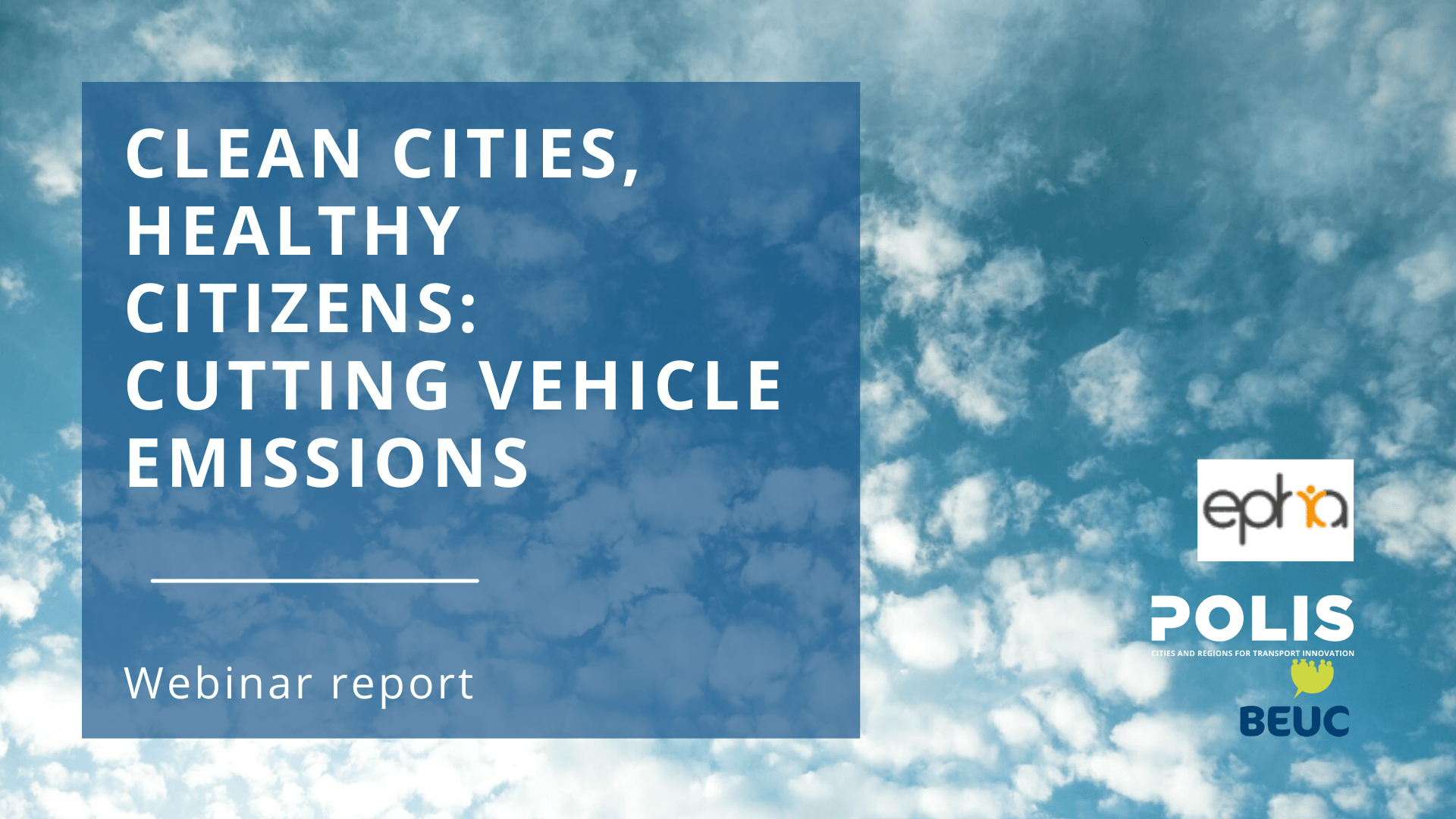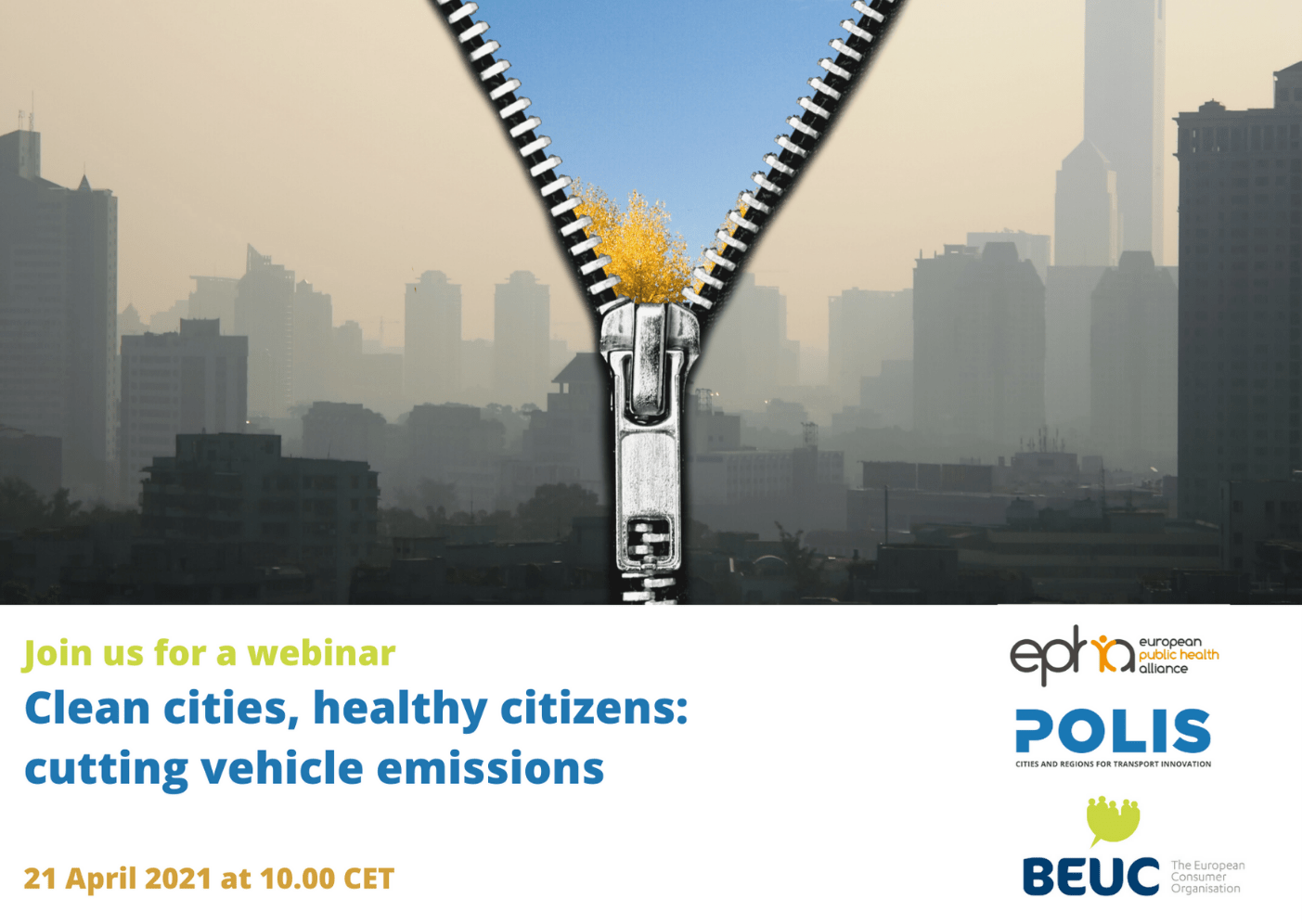Clean Vehicles and Air Quality Working Group joins BEUC and EPHA for collaborative webinar
The official ruling that air pollution made a “material contribution” to the death of nine-year-old Ella Adoo-Kissi-Debrah in London marked a stark- and tragic- moment in Europe’s fight against poor air quality. As cities and regions strive to slash vehicle emissions, the judgement reinforced the necessity for rapid action. The planned Euro 7 standard can become an important juncture to improve air quality in European cities and regions.
On 21 April, POLIS’ Clean Vehicles and Air Quality Working Group convened for a joint webinar, co-organised with the Flanders region, The European Consumer Organisation (BEUC) and the European Public Health Alliance (EPHA) to discuss the potential post-Euro 6 standard, its impact and opportunities for creating healthier, more sustainable urban environments.
The “Clean cities, healthy citizens: cutting vehicle emissions” webinar brought together POLIS,) cities, regions, consumer and health organisations which have worked extensively on urban air quality.
This joint event was a chance to share expertise and practical advice for tackling transport related pollution, navigating the financial, policy and logistical hurdles.
The event addressed key issues including:
- Risks to health caused by air pollution that is linked to transport
- Recent developments in the development of Euro 7 standard and transposition of the Clean Vehicles directive
- The role local and regional authorities can play in the development of the new emissions standards
- How new Euro 7 standard can help boost uptake of zero emission vehicles and electric vehicles in particular
- How citizens can be engaged in improving air quality at the local level
Clearing the air: Why is the new standard so important for the cities and its citizens?
Improving air quality is a major concern for cities. According to World Health Organisation (WHO) estimates, air pollution kills around seven million people worldwide every year, with 9 out of 10 people breathing air that exceeds WHO guideline pollution limits.
Action is required fast; however, this cannot be achieved without cooperation. To explore the way forward, this event brought together a range of experts from Flanders Environment Agency, Transport & Environment, EPHA, BEUC, the European Commission (DG GROW and DG MOVE), to examine how impending challenges can be confronted.
Roel Vaneerdeweg, Flanders Environment Agency explained how new emissions would affect mobility, and why cities should be concerned about the new regulations, explaining the main points prese sharing some findings from a recent research being conducted in Flanders on emissions policies and calling on others to appeal to their national governments for support.
Cristina Pricop from EPHA agreed on the importance of these factors and highlighted the health costs of transport emissions to citizens in cities.
Why- and how- has the Euro 7 standard been developed?
Ms. Dilara from the EC walked participants through the timeline of the new standards, exploring how the European Commission has been consulting, testing and assesses revisions to emissions regulation.
She then explained how the current Euro 6 standard has helped to reduce emission but still present issues that need to be addressed, such as emissions outside the RDE boundaries and the durability of emission control systems.
To support this discussions, Dario Dubolino from the Commission also provided an update on the Clean Vehicles Directive (a directive introducing rules and national targets for procurement of cleaner cars, vans buses and trucks), emphasising the role of public procurement.
Pushing for clean vehicles through public procurement was identified as effective avenue for signalling changes to the market and driving transition.
Emissions on the ground: The example of Lithuania, Slovakia and Poland
Across Europe, NGOs and cities are conducting tests on air quality to improve understanding of pollution and identify hotspots. Petra Cakovska from Spoločnosť ochrany spotrebiteľov presented one project which has leveraged citizen science to achieve this and raise awareness across Lithuania, Slovakia and Poland.
Ms. Cakovska explained the citizen science project which had been measuring air quality in cities including Vilnius and Warsaw, with particular focus on areas such as parks, hospitals and schools.
The future of vehicle emission standards: the panel discuss
The meeting then turned to a panel discussion on the role of the cities and citizens in the future vehicle emission standards. This was a chance to dive further into the issues presented in the first half of the meeting.
Panelists included:
- Gabriela Barrera, POLIS
- Zoltán Massay-Kosubek, EPHA
- Robin Loos, BEUC
- Jens Müller, T&E
Core challenges for cities and regions were identified:
- How to work with national governments to ensure legislation serves local needs- The poll revealed almost 70% of attending cities and regions did not plan to be involved in shaping Euro 7, yet it is in urban areas where pollution is felt most, and where standards will have the most direct impact.
- How to ensure Euro 7 standard has ambitious and stringent measures and enters into force in time
- Challenges engaging citizens in air quality issues and policy recommendations- without engaging mobility users themselves in understanding pollution and the need to reducing pollution, transformational shifts cannot be achieved,
About the POLIS Clean Vehicles and Air Quality Working Group
This group addresses major challenges related to air quality and current developments in the field of clean and sustainable transportation within our cities.
To find out more, please contact Gabriela Barrera or Sabina Asanova.
Please note that POLIS Working Group meetings are open to POLIS members only. If you are interested in finding out more about our membership options, please contact Pasquale Cancellara.


